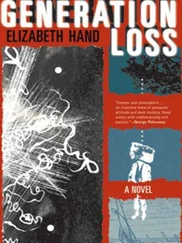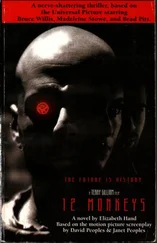So much for the great dynasty the scientists would found in space. Now, gazing upon the empty sky where the Ascendants’ splendid lights should shine, I thought of the energumens. Had they finally rebelled against their masters?
It was a terrifying notion. That HORUS—the last real bastion of human technology, and the only means of linking those scattered outposts on Earth—might now be controlled by geneslaves….
They were physically stronger than we were. They had been engineered to live in places where humans never could—the hydrapithecenes in water, the salamanders in temperatures exceeding 125 degrees Fahrenheit. And the energumens possessed an intelligence that often exceeded that of their masters. That was why they were used as crew and engineers on Quirinus and Helena Aulis and Totma 3, the most important stations, where it was thought that they would be more reliable than humans, less prone to corruption or complicity.
I fell silent then, reluctant to share more of my fears with Nefertity. She looked away from me, and I let my gaze drift back to the heavens, anxiously scanning the stars for signs of other stations—the Commonwealth space settlement or the great shining links of Faharn Jhad, the Emirate’s colony. They were gone. I spotted a single glittering mote in the eastern sky that might have been part of Faharn Jhad, but that was all. HORUS was fallen, or falling.
After a long time Nefertity spoke. “If the geneslaves have rebelled, then this nemosyne you seek, the one called Metatron: surely it has fallen into their hands?”
I nodded grimly. “Or it might be that they are not aware of it—they may never have heard of it, for all I know. Or they may already possess it. If they have, it is even more important that I find it.”
Nefertity’s gaze turned to the unwinking lights of the valley settlement. “But how would you ever locate Metatron up there? And finding it, how could you seize it for yourself?”
I continued to stare at the sky. Finally I said, “The nemosyne network was designed so that each unit could, theoretically, communicate at any time with any other unit on Earth or within HORUS.”
She nodded, the pale golden gleam of her neural fibers casting a grave light upon her exquisite features. “But if there are none of us left—”
“There is at least one,” I said. I raised my hands before my face, flexing first the metal tendons of one and then my other, human, fingers. “ You. Even if only one other nemosyne exists, it should be possible for you to contact it.”
“But I am only a folklore unit—”
“It doesn’t matter.” My voice was sharp. “There is a rudimentary communications network out there still—or was, as of seven months ago.”
I gazed at the horizon, now pale gray, the desert stars prickling and fading into dawn. “And there may be other network centers that survived the Shinings—the City of Trees had one, I found it in the ruins beneath the cathedral there. Quirinus had one as well. We have only to go there, and have you linked with it, and we could track down Metatron.”
The nemosyne’s eyes blazed with disdain. “Even with your humanity peeled away, you are a madman! I would never consent to this, Margalis. And even if I did—what then? If you were somehow to locate Metatron, even to possess it—what would you do? Ignite the remaining arsenals within its range and bring the Final Ascension to the world? No, I will never help you.”
A sudden desperation overcame me then. It was not the thought of the arsenals that drove me, but imagining a world with nothing to hold it together, not even barbarism. Because primitive as it may have been by the standards of earlier centuries, the Ascendant Autocracy had managed to cobble together some semblance of order, uniting those remaining pockets of civilization under the reign of the NASNA Aviators. By comparison, the Commonwealth and Emirate had only the most rudimentary technologies; and even these were failing.
And there was another reason. Something I could scarcely admit to myself, though I knew it was true. And that was this:
I had been trained—bred, practically—to serve. The betrayal I had originally intended with the aid of Metatron: was it not but another face of servitude, another sign of the chains that bound me to my masters, that I could think of no use for the nemosyne but to make war upon those who had used me as an instrument of war? Without the Ascendants I had neither foe nor master. I needed no reasons to live—I could not, cannot, think of myself as alive in any real sense. But I needed some compass to guide me. The Ascendants had been my lodestar. Without them or the world they had made, I was nothing but an empty shell, a corpse damned by my masters to wander the earth forever.
But with Metatron I might be able to find and unite those few surviving outposts, those scattered cities and celestial stations that had not yet been given to the darkness. In so doing I might find— must find—some reason for my existence, something greater than myself; something to serve. I was no longer human—indeed, some might think I had more in common with the energumens and other heteroclites than I did with my former ancestry. And yet something in me sickened at the thought of the world being wrenched from mankind and given over to its monstrous children. I turned to the nemosyne, took her shining metal hands within my own, and squeezed them, hard enough that their outer casings crackled like thin ice beneath a boot.
“If you do not consent, I will take you by force, Nefertity. Even within this shell I am still an Aviator. I know how to disable replicants and reprogram them. Then you really would be nothing but a hollow unit; but I would need nothing more than that for my purposes.”
She pulled away from me. I let her go. Where my steel hand had grasped her, her delicate outer skin glowed cobalt; but my human hand had left a black shadow upon her translucent membrane. Her voice was low as she replied, “Even with Metatron, the Aviator Imperator could not control the entire world.”
I laughed: a single sharp retort like a branch snapping. “I have no desire to rule the world, Nefertity—”
And I raised my metal hand until I could see my face reflected in the palm’s silver crater. A crimson mask of smooth plasteel, distorted into the semblance of my former, human visage. Only the eyes remained of that soft strata of flesh: eyes pale as melting snow, the blue all but leached from them even as all compassion and frailty had been leached from my soul. I spread my fingers until I could gaze out between them, past where Nefertity turned away in disgust; past where the first cold rays of sunlight struck the harsh earth. In the half-light three fetches lurched from shadow to shadow, shambling back to their crude homes. Miles distant, fougas would be returning to their hangars after seeding the countryside with viral rain. Somewhere miles above us the energumens rewove the tapestries their human parents had begun.
“It is a world that has already been twisted and burned and poisoned beyond all hope. It is a world already made in my own image,” I said at last, and lowered my metal hand. “I fear it is a world that is ready to die.”
And I cried out, a wailing shriek that sent the last night creatures scuttling into their holes, and shook the branches of the huisache like a cold wind. Then I turned away, my thoughts falling once more upon that game I had played decades before with Aidan Harrow and the others at the NASNA Academy. I knew now what I had not known then, that there was something that I feared—
The immortality I had been cursed with: the aeons that lay before me while I lived on and watched the world, my poisoned yet enduring world, drop from the faltering hands of humanity into ever deeper horror and decay.
Читать дальше












